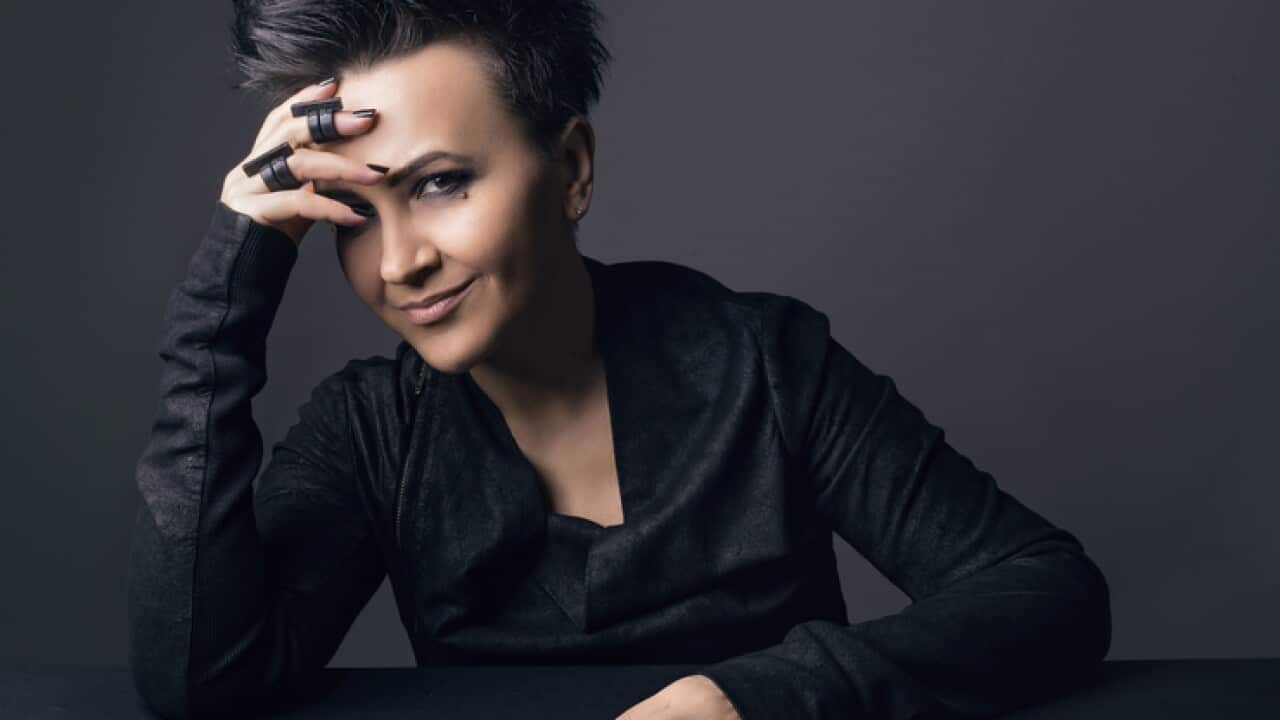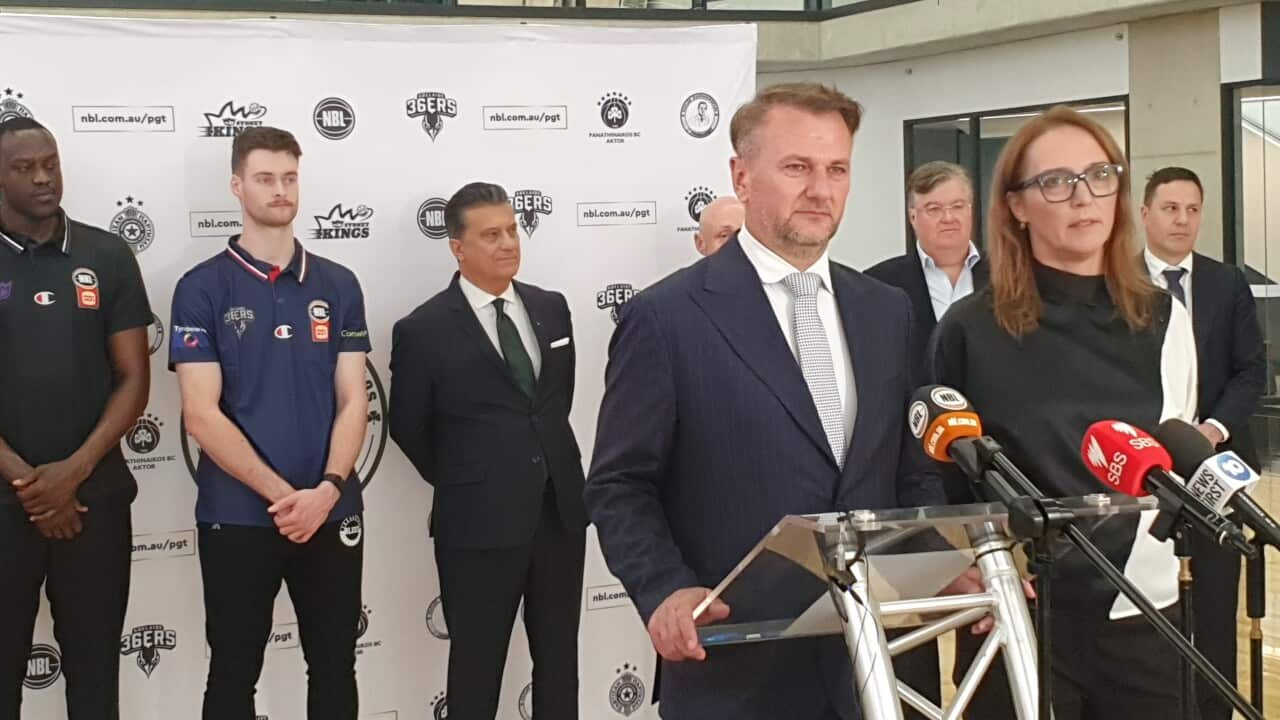Amira Medunjanin plonks herself on the couch of the backstage waiting room right after her concert in Camelot Lounge in Sydney. She’s wiped the remaining tears from her cheeks after an emotional final song and re-applied a bit of lipstick.
“Ovo mjesto je ludo,” she tells me.
It is crazy - I agree.
“We don’t often play in clubs,” she continues, “but the first time I walked off the stage into the backstage area, I saw a portrait of David Bowie to my left. I then looked to the mirror on my right and saw the portrait reflected. There I was, standing between two,” she thinks of the right plural, “between two Bowies’. I like this place.”
Amira Medunjanin is a Bosnian singer of a very specific type of music - sevdah or sevdalinke. It’s a genre of music where if you know - you know, and if you don’t, this is the moment you YouTube it and never look back. If you ask me however, her performance at Camelot Lounge could’ve also been the launch of a very successful stand-up comedy career.
She’s confident, witty, sharp - graceful. Just before she starts singing, a phone rings in the back of the room.
“If that’s my mother - or my mother-in-law, don’t answer,” she says, “but if it’s yours then please do, we’ll wait. It might be urgent.”
While she gets the crowd talking between songs, like a kindergarten teacher in charge of a class just come back from lunch, the second she starts a new song she’s once again captured our unwavering attention.
“Ja ne znam što vi sad pričate?” she asks a giggling table to her right.
Backed by the genius of Ante Gelo on the guitar and Zvonimir Šestak on the double bass, her style is hard to put into words. She doesn’t have a set list, she sings as she feels and as the crowd responds. She even takes requests.
“Dje se toga seti," she asks at one point, switching back to her native tongue after promising to speak in English the whole time, "Pa to ne znam ni ja odpjevati.”
Going around the room, she shouts out different cities and regions in Eastern Europe, asking if anyone is ‘actually Australian’ - there were a few, she asked for one man’s name, he said ‘Paul’. She picks out a Peruvian man and an Indian woman from the crowd and then tells us how lucky we are to live together and to be able to share our culture with each other.
“Where are you from?” she asks a table toward the front.
“Brčko,” someone shouts out and cheering ensues. She has a good chuckle.
When she asked everyone where they were from, she had good reason to. In fact, each part of the land that once was Yugoslavia got a taste of ‘sevdah’ from their hometown. Iconic ballade ‘Jovano, Jovanke’ from North Macedonia, a few songs later a hit by Zagreb’s famous Azra, ‘Ako znaš bilo što’. We heard ‘Ajde Jano kolo da igramo’ and an alternative version of ‘Moj dilbere’
“I’m a big champion of women’s rights,” she tells the crowd before she starts ‘Moj dilbere’.
“This was written five centuries ago and when I translated the song the female singer says, ‘take me to the market and sell me. In return for the gold you get for me, build a big golden door.”
She makes a grimace and smacks her lips, “No.”
“No, no,” she shakes her head, “I won’t sing that. I’ve found another version which says - If you’re not visiting me because you are sick, then I am ok with that I will wait for you to get better and then you will come. If you’re not visiting me because you are with someone else, well…”
She does a slow twirl on the stage. “Well...” she repeats and motions for Ante to start the song.
I ask her about this after the concert, whether she ever feels afraid to inject ‘feminist’ remarks between songs and reboots of songs - especially in front of an Eastern European crowd.
“Never ever afraid to make those kinds of statements,” she says. “I am thrilled about the fact that I have the power that people can listen to me, and they do listen to me. They can technically leave the concert, but they normally don’t, they hear what I have to say. That is one of the reasons I’m in [the] music [industry].”
We discuss for a bit the trouble of ‘feminist’ labelling – to which Amira says she might not be ‘hardcore’ but then quickly reconsiders.
“Well maybe I am, I don’t look at it that way. The songs are from a while ago, but the horrifying thing is that bad things are still happening to women in the Balkans, in the rest of the world as well. There are still women who are in jeopardy and I hate that. My husband used to work for a gender centre and we are very much fighters for gender equality. Look at politics, look at any workplace office – some offices and some companies don’t have equal representation or equal pay.”
Amira says it’s one topic she fights for with all her heart and is “never scared”, even at concerts in the most “patriarchal” countries.
“I speak the same in environments where men are dominating,” she says. “I notice the shock, I hear the bad words and comments, social media abuse.” She shrugs as if to say, who cares.
“It means I got to them.”
Going back to the music however, though Wednesday night was a much more intimate atmosphere than the huge concert halls of Europe she fills with ease, Amira says that each of her performances are not concerts - they’re a night out with friends.
“I like to go into the audience, no matter where I am performing. Of course, that’s harder in bigger spaces, but I crave that interaction with the people I am performing for. I want to reach out and grab their hand, I want to cry with them and see their faces. That’s also the reason I never have a set list. For sure, we go through what songs to play there is a rough idea. But when you’re hanging out with friends you don’t say, ‘okay for the first ten minutes we will talk about this and then the next conversation will be this’. You just meet up and you see where it takes you. That’s what my performances are, I meet up with people who have sacrificed the most valuable thing we have - their time- to be with me, to hear me. I am grateful for that and I want us to share that positive energy.”
Throughout this ‘catch up’, Amira and Ante egg the crowd on to sing along, in fact more than once, they stop to hear us mumble, out of tune and filled with wine.
After the show, they both tell me this is what musicians live for - a crowd that’s in the moment with them, that pushes them to sing and play songs they would never have thought of in a million years. Certainly, this trio will bring the same energy to the National Multicultural Festival in Canberra today and over the weekend.
I did have a question about multiculturalism, but in the context of the night it seemed silly to ask. Multiculturalism isn’t a definition, it’s a feeling and an attitude like that one I felt in that room on Wednesday night. Amira knows this too, she’s lived through scary times in Balkan history.
“I’m not nostalgic for the past,” she muses, “but I am nostalgic for that ‘normal’ feeling.”
That’s what Amira brings to her shows - the normality of human interaction and emotion. We’re from different places, religious, speak different dialects, and in Paul's case- a completely different language, but the emotions felt were shared by all.
Amira closed the show with a raw rendition of Aleksa Šantić’s ‘Emina’. She stepped away from her mic, to the edge of the stage and sung- the hum of the audience singing along with her in the background.
Probably as multicultural as it comes.
Poslušajte intervju - Listen in language! For the full interview with Amira Medunjanin press play on the cover photo.




